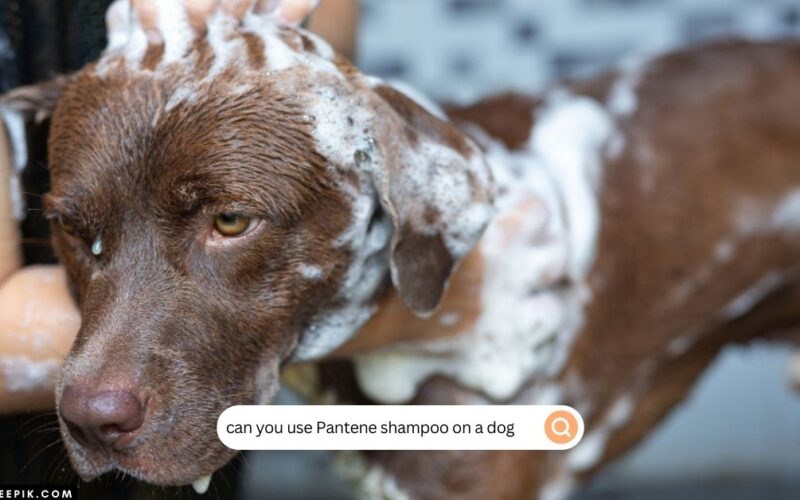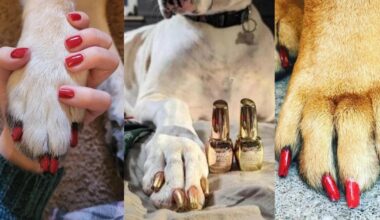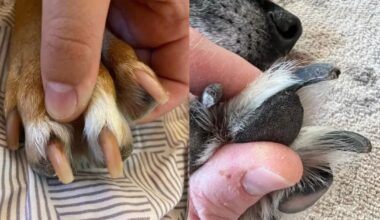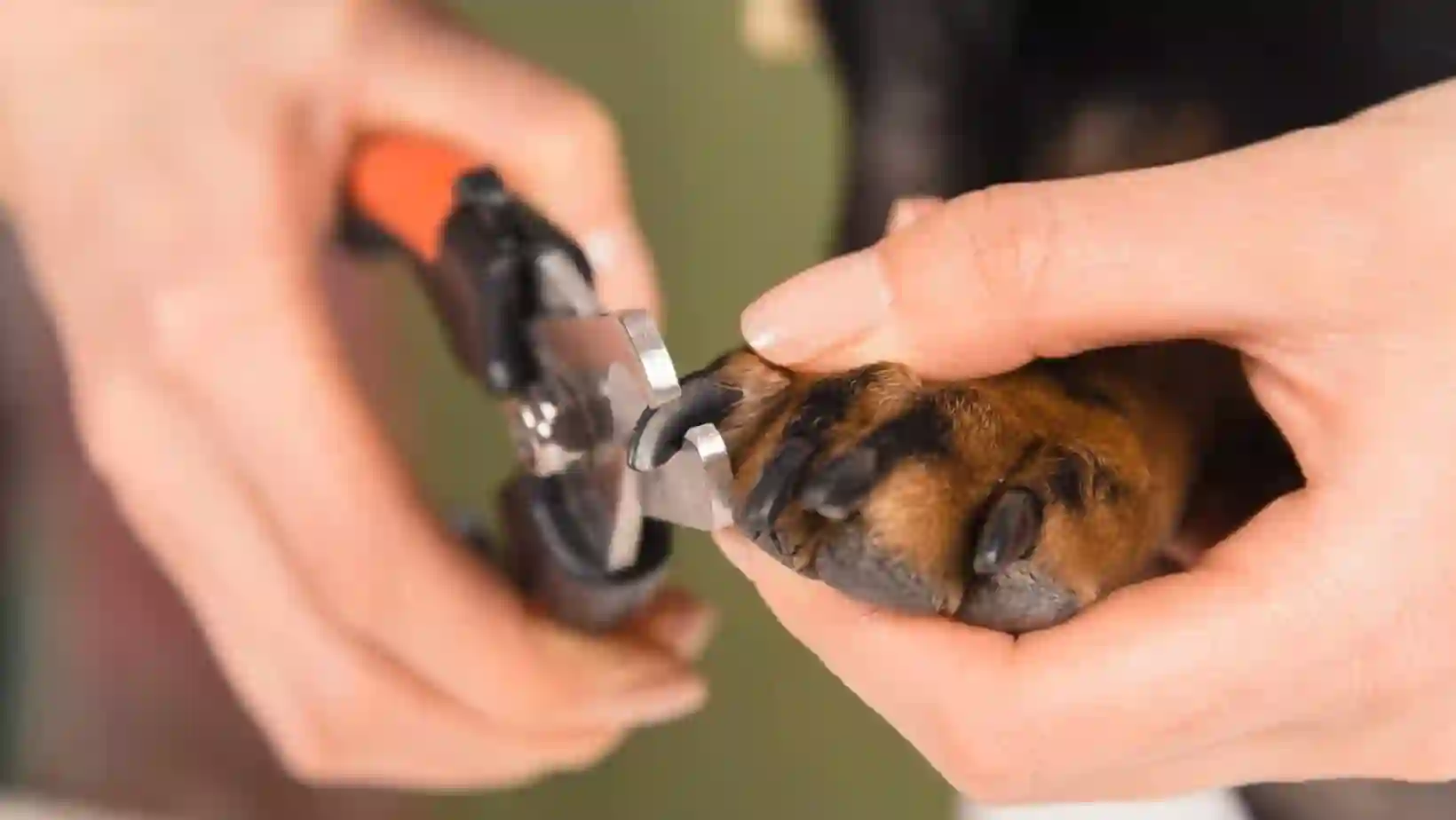Many pet owners have been in a situation where they run out of dog shampoo and wonder if they can use their own. One of the most commonly asked questions is whether can you use Pantene shampoo on a dog or not.
While human shampoos may seem like a convenient solution, it’s important to understand the difference between human and dog shampoo before using it on your pup.
Can You Use Pantene Shampoo On A Dog
No, human shampoos, designed for our skin (pH 5.2-6.2), can upset the natural pH balance of dog skin (pH 5.5-7.5), causing irritation. Not only Pantene, but almost all human shampoos contain ingredients like sulfates and parabens, unsuitable for dogs, potentially leading to skin problems such as dry skin and hair loss.
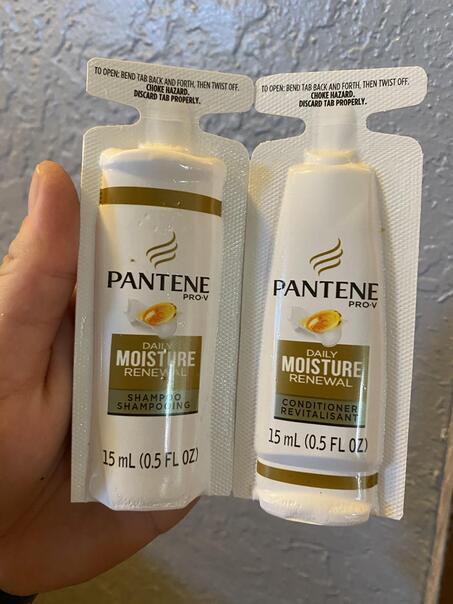
Can You Use Pantene Conditioner On A Dog
Just like shampoos, our conditioners are formulated specifically for human skin pH; hence, they can cause itching, scratching, redness, inflammation, and dry, flaky skin on dogs. So, no, Pantene conditioners are not safe for dogs.
What Human Shampoo Can I Use On My Dog?
Baby shampoo is the best choice for your pup if you’re left with no choice. Baby shampoos are designed for delicate skin and don’t include any harsh substances that could sting your dog’s eyes or trigger an allergic response. Just be sure not to use it too much and frequently.
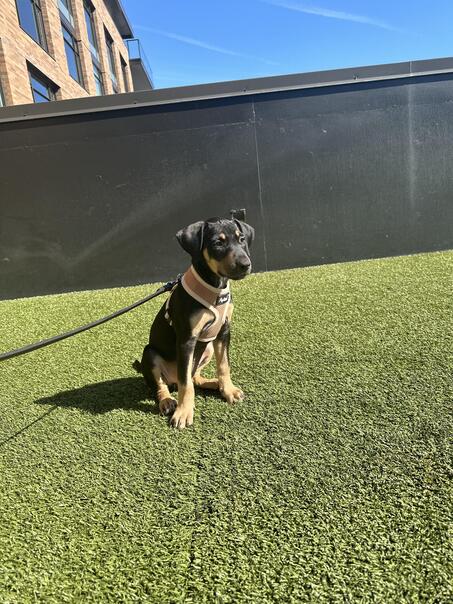
What Can I Use If I Don’t Have Dog Shampoo?
If you suddenly find yourself out of dog shampoo or need to bathe your pup away from home, rest assured that you’re not completely out of luck. While human shampoo isn’t a safe alternative to dog shampoo as we now know, the following household products can be used as a substitute for dog shampoo only as a last resort:
- Baby shampoo is probably the most popular dog shampoo substitute. It is gentle enough to use on dogs and will not strip their coat of natural oils. Just make sure to use a very small amount and rinse thoroughly. But the only problem one can have is to have a BABY… Well, if you’re among them below 3 would be suffice.
- Baking soda can be used to freshen up your dog’s coat. Just make a paste with water and baking soda, apply it to your dog’s coat, and rinse well. Baking soda can help dry out rashes, and redness and alleviate itching in dogs. To add fragrance, use talcum powder after drying your pup.
- Dish soap is another common dog shampoo substitute. It can be used in a pinch, but it should only be used as a last resort as it can be harsh on your dog’s skin. Frequent use of dish soap can cause skin allergies in your furry friend.
- White vinegar is a great way to get rid of any lingering odors on your dog. Simply mix equal parts water and vinegar, apply it to your dog’s coat, and rinse well. In fact, apple cider vinegar can help soothe minor dog skin irritations such as dry skin, itchiness, and dryness.
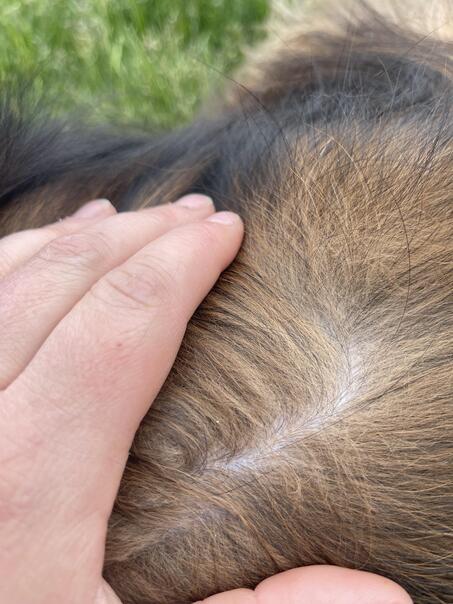
Always keep in mind that If you use any of these solutions, be sure you use the SMALLEST amount possible and try to use them locally, where the coat is the dirtiest. Always remember to rinse thoroughly with a lot of water.
7 Dog Breeds with Sensitive Skin
Sensitive skin isn’t just a human issue; many dogs also suffer from skin conditions that require special attention and certain dog breeds are predisposed to sensitive skin due to various factors, including coat type, skin folds, and allergies, including;
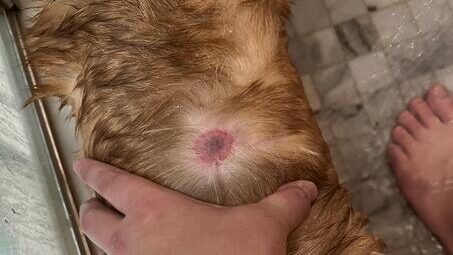
Bulldog

Yes, bulldogs, like many other dog breeds, can have sensitive skin.
Bulldogs are known for their wrinkled skin, which can create pockets and folds where moisture and debris can accumulate.
These folds can be prone to skin irritation, redness, and even infections if not properly cared for.
Additionally, bulldogs may be more susceptible to environmental factors like allergies or harsh chemicals in grooming products, which can exacerbate skin sensitivities.
Chinese Shar-Pei
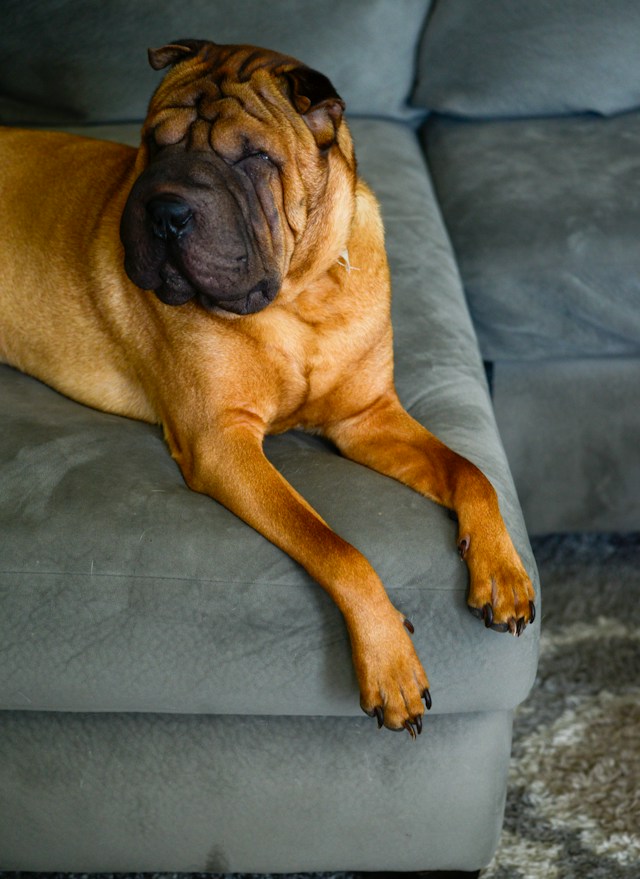
With plenty of skin folds and naturally short hair, the likelihood of skin irritation for Chinese Shar-Peis is fairly high.
Short hair increases the amount of skin contact with potential allergens. The folds in the Chinese Shar-Peis skin can provide a breeding ground of humidity and warmth that is ideal for yeast growth and can lead to bacterial infection.
Regular grooming and protection from allergens can help prevent skin discomfort for Chinese Shar-Peis, but they may still develop skin problems that require treatment.
Boxer
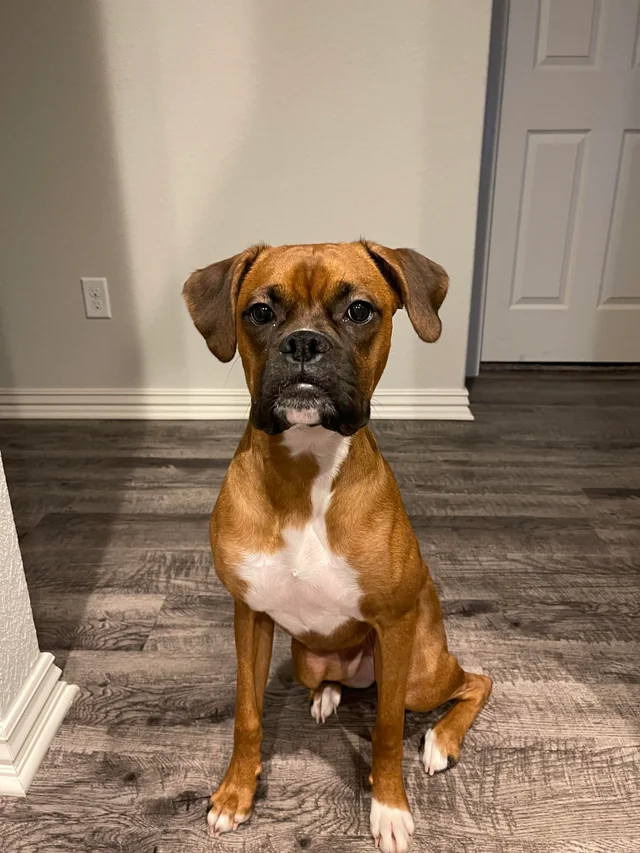
Boxers are a high-energy breed that loves to play and run around outdoors. Unfortunately, their short coats make them more prone to skin problems, such as skin infections. Boxers are also susceptible to allergies, especially tree and weed pollen allergies.
Since Boxers may be sensitive to high-grain food products, pet owners should also watch their dog’s diet closely. For example, some Boxers have food allergies to dog foods with wheat or corn as an ingredient.
A Boxer experiencing an allergic reaction to food or environmental factors may have skin irritation, excessive scratching, lesions, vomiting, diarrhea, or hair loss.
Golden Retrievers

Golden Retrievers commonly suffer from skin allergies. They tend to develop canine atopic dermatitis, a predisposition to showing allergy symptoms to things otherwise harmless.
This dog breed often has allergic reactions to mold, weeds, grasses, and fleas, leading to intense biting and licking at an allergy site. The dog may develop dry, itchy areas and hot spots due to the attention focused on the itchy area, meaning the skin becomes inflamed.
Hot spots and allergies can be, at minimum, annoying. At worst, hot spots are quite painful and threatening to the dog’s overall health.
Bull Terriers
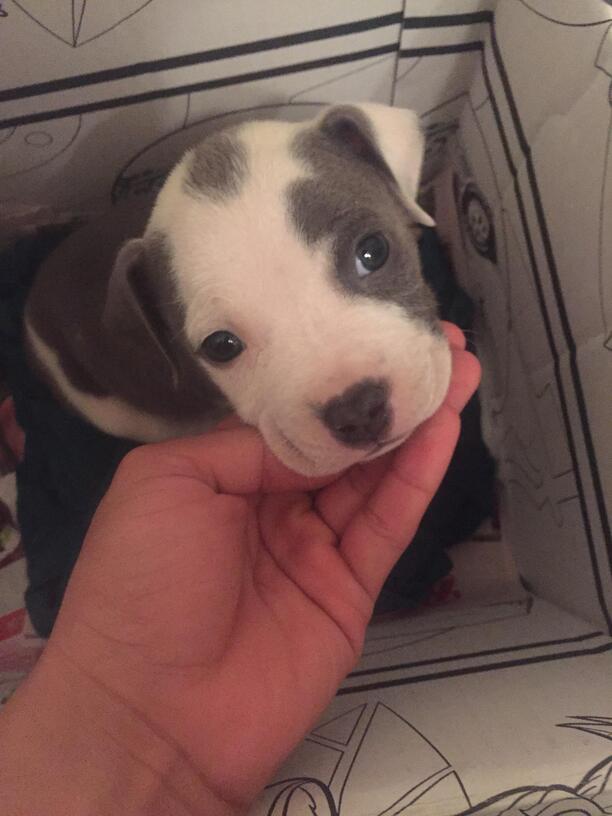
Bull Terriers often have sensitive skin and are known for suffering from atopic dermatitis. This dog breed commonly reacts negatively to pollen, detergents, mildew, dust, and chemicals. Bull Terriers with itching or skin irritation should be promptly treated by a vet to prevent skin infections or sores.
Some people have claimed a correlation between white coats on dogs and skin problems, but there is little evidence to back up that claim. On the whole, it is an unfounded rumor. There is, however, one exception. Bull Terriers with white coats do seem to have a slightly higher likelihood of developing skin conditions.
Bichon Frise

When it comes to skin issues, Bichon Frise pups stand out due to the breed’s adverse response to insects, especially fleas. In addition to their tendency toward having a flea allergy, problems that affect dogs of the Bichon Frise breed include food and environmental allergies.
If you have a Bichon Frise family member, it’s more important to protect them from flea bites than other pets, as they may experience unrelenting itching when bitten.
Keep them inside when possible. When outside, be sure to use flea protection as prescribed by your vet.
English Setter
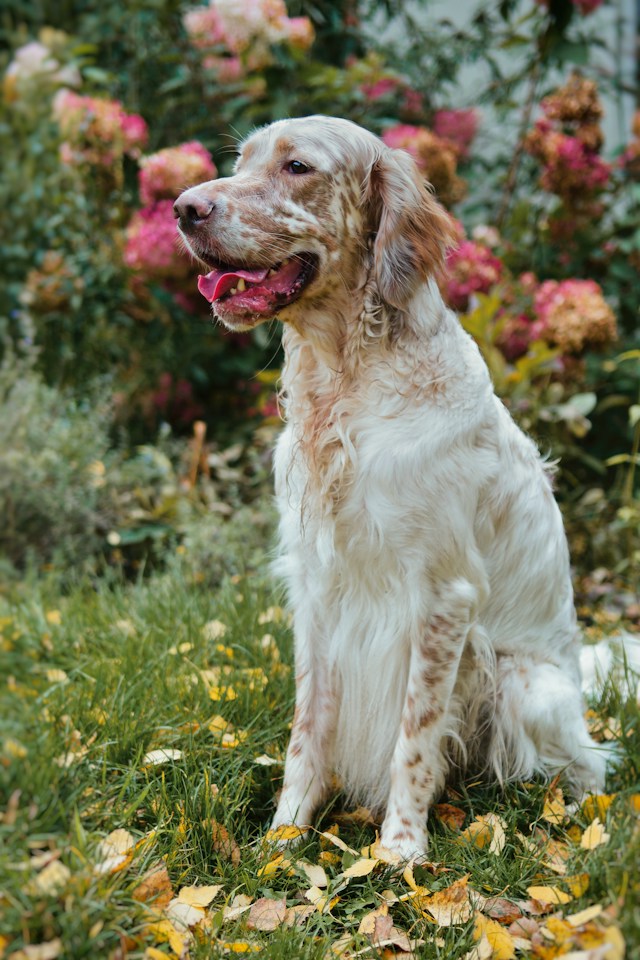
English Setter dogs are prone to sensitive skin due to genetic factors.
Their thin coat, allergies, environmental influences, diet, and susceptibility to parasites.
It’s essential to prioritize their nutrition, employ gentle grooming products, stay vigilant for signs of allergies, and promptly seek veterinary assistance when needed.
By consistently implementing these measures, owners can effectively manage the skin sensitivities of their English Setter companions, ensuring their comfort and well-being throughout their lives.
Common Question:
Can I use baby shampoo on my dog?
Baby shampoo is generally a better option than regular shampoo as it is clear, odorless, and gentle. If your dog has particularly sensitive skin, baby shampoo can be a good choice to combat this as it contains milder ingredients than regular shampoos.
Can I use dawn on my dog? Is dawn dish soap safe for dogs?
Using Dawn dish soap is actually safer among many dish soaps because it works best for killing fleas & dirt where other brands may not, and it’s the safest for your dog.
Can I bathe my dog without shampoo?
If you think a quick rinse down with water would be enough to clean your dog, think again. It may help remove visible dirt, but water alone will not provide the deep clean your pooch needs. Properly formulated dog shampoo helps to remove dead skin, dirt, and excess oils along with undesired odors.
Is white vinegar safe for a dog’s skin?
Vinegar is acidic and can be too harsh for your dog’s sensitive skin. Typically a 1:1 ratio of vinegar and water is enough to treat skin issues. However, if your dog’s skin is sensitive, you may consider diluting 1 part vinegar with 2 parts water. Testing the solution on a small skin area before applying it is crucial.
Takeaway
It’s preferable to avoid using human shampoo on pets, however, some people have been known to do so.
Pantene is gentle enough for even the most delicate skin and hair, but it is still designed for human skin pH.
Because of this, using Pantene on a dog could cause irritation or allergic reactions that are unpleasant for both you and your furry friend.
So stick with products made specifically for dogs’ delicate needs.
